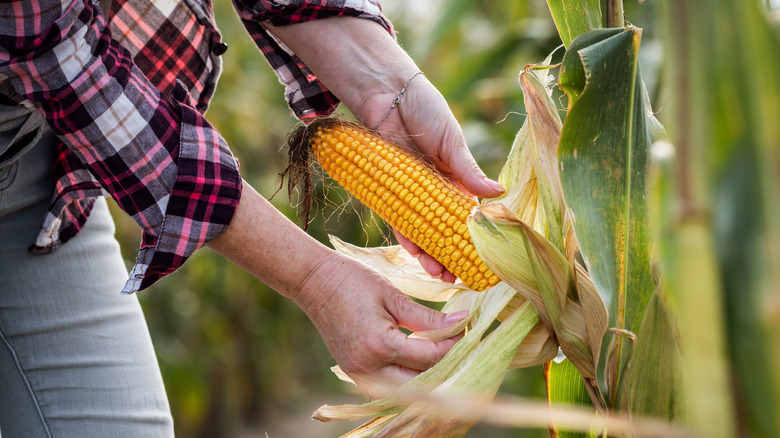The Health Benefits Of Corn Explained
There is a lot of contradicting information about corn online. Some say it's a carb with little nutritional value while others insist it's one of nature's best vegetables. With how widely used it is in many American products, it's a good idea to know what you're putting into your body when you munch on popcorn, throw a handful of frozen corn in a soup, or eat freshly grilled corn on the cob this summer.
To start off, let's understand what corn is. According to Healthline, corn is technically a vegetable, a whole grain, and a fruit. Eating corn in its full form, like corn on the cob, defines it as a vegetable. However, the corn kernels themselves are considered grains. (This means a bowl of popcorn is not the same as munching on a bowl of broccoli, unfortunately.) To make things even more confusing, corn kernels come from the seed of the corn plant, which technically makes them a fruit.
However it's identified, is corn actually good for you? There are many health benefits of this food. Corn is high in fiber, making it a good snack or meal addition for people who could use help with their digestion (via Mayo Clinic Health System). It also contains plenty of essential minerals like iron, copper, zinc, and magnesium. You'll find lots of B vitamins in sweet corn. Finally, corn is a decent source of plant-based protein.
How to incorporate corn in your diet
One reason many people may not think corn is very healthy is that it tends to be prepared in less-than-healthy ways. (Think movie theater popcorn, buttery corn on the cob, and sweet caramel corn.) These treats, while delicious, are not the best ways to incorporate corn into your diet.
Avoiding slathering your corn in butter, which can add lots of fat and calories (via WebMD). Instead, opt for healthier fats like olive oil or avocado oil. You can also add flavor with lime juice, chili powder, or paprika. The same principle should be followed when making popcorn. Pop your own kernels at home and only add a small amount of natural butter, olive oil, and/or salt. Seasoning your popcorn with salt-free spices can add flavor without increasing the sodium content.
Of course, it's fine to enjoy movie theater popcorn or buttery corn on the cob in moderation. Just be sure to keep an eye on your fat intake and avoid eating fatty and salty versions of this food too often.


